On the set of 'The Handmaid's Tale' and inside the next chapter of Margaret Atwood's dark world
"Nightline" was granted rare, behind-the-scenes access.
It's hard to believe that as dark and dystopian as "The Handmaid's Tale" was in Season 1, Season 2 gets even darker.
In this new season, Hulu's blockbuster drama series starring Elisabeth Moss goes even deeper inside a police state called Gilead in what used to be the United States. The series is set in the near future after a devastating civil war.
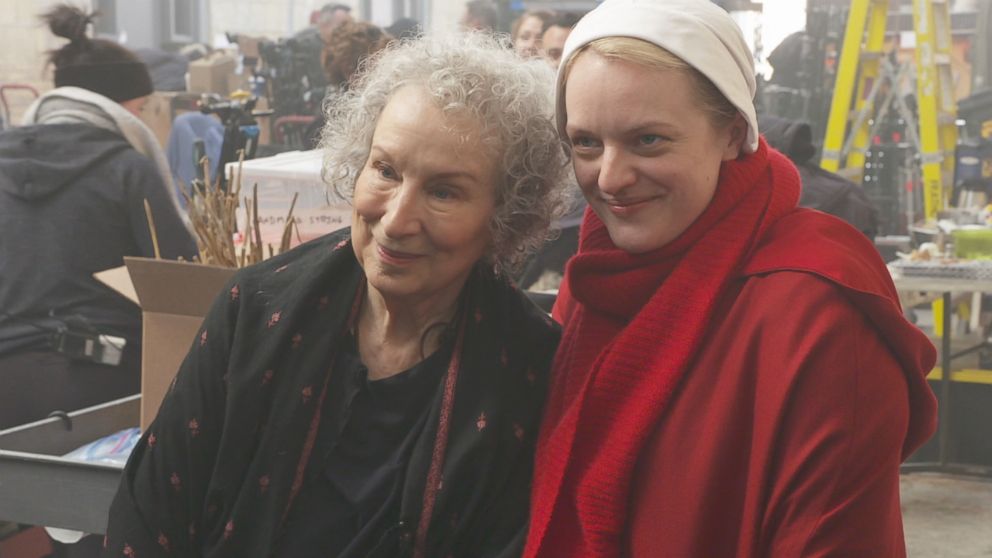
This new American regime is a theocracy that oppresses women in particular. They're not allowed to read, write or think for themselves. Fertile women are enslaved, forced to bear children for the ruling class and impregnated by rape. Then, they are forced to hand over their babies.
It's as if the Puritans borrowed a few ideas from the Taliban and developed their own uniquely American caliphate.
The world of "The Handmaid's Tale" came from the imagination of Canadian author Margaret Atwood, whose 1985 novel was hailed as a feminist classic.
The TV series is even filmed in Canada -- Season 2 was filmed in frigid Toronto in the dead of winter -- and Atwood got to watch the dark world she imagined come to life.
"Nightline" was given rare, behind-the-scenes access, in which its cameras had somewhat free range to examine the details of the handmaid's world.
Cameras observed the genesis of Season 2 in the writers room in Los Angeles, tagged along to location scouting in Toronto and witnessed the iconic creativity of costume designer Ane Crabtree and her team.
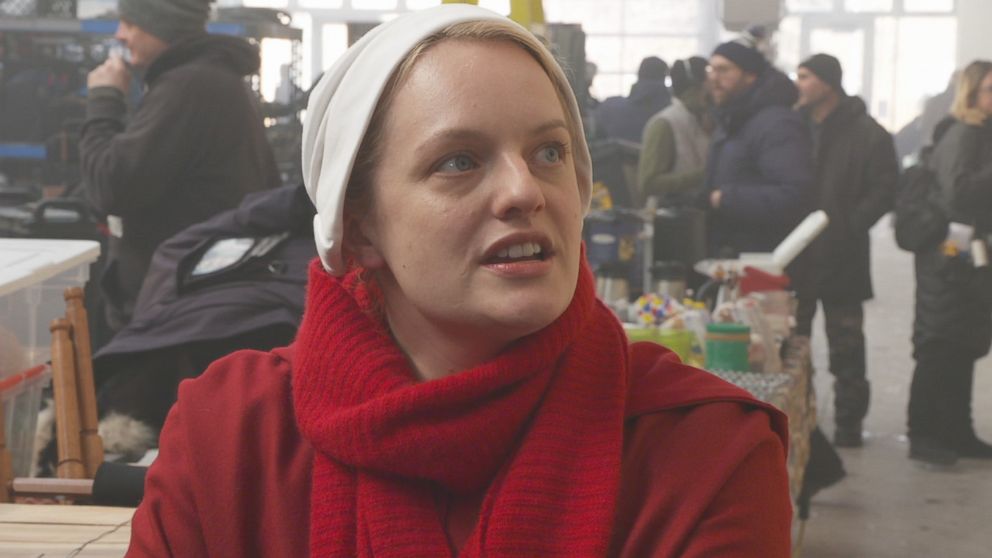
Canada is an important setting in the show, especially for Samira Wylie's character, Moira, who managed to cross the border and be granted asylum in Season 1.
"It's shocking to her," Wylie said of her character. "Especially, I think in the scene where we see Moira in the refugee center. She can hardly take all that's coming to her. She gets money, [a] health insurance card. She gets all of these things."
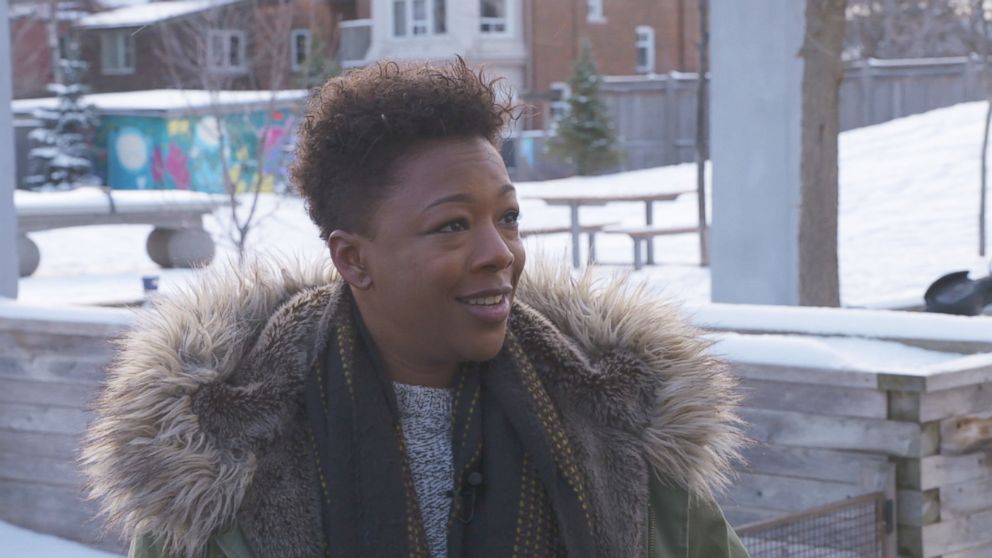
Season 2 explores more of the characters' backstories. Crabtree, the costume designer, had an enormous board of magazine ads, photos, and pieces of fabric that serve as inspiration for the characters' clothes. She pointed out some tantalizing hints about the new season through a piece of blue fabric.
"It's a faded color," Crabtree said, holding the blue fabric. "This is something that's faded. That's all I will say to you and it's a person that might be sad because ... a woman that wears this color ... her color has been drained from her."
Crabtree and her team made everything themselves, including the handmaids' bonnets, which are called "wings."
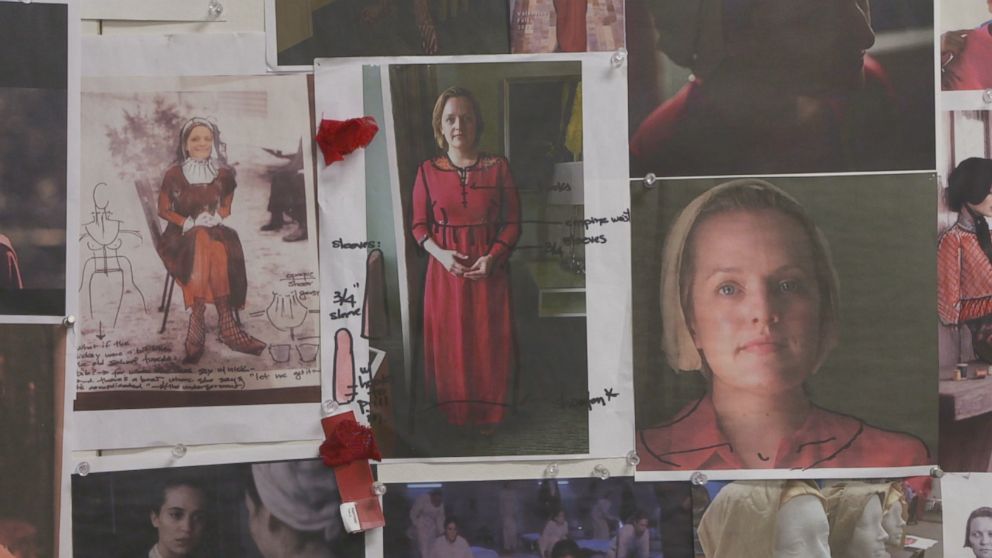
Between takes, as soon as the cameras stopped rolling, the cast often covered up in big Canada Goose jackets. Atwood was also on set and somewhat jokingly chided a few actresses dressed as handmaids for using their cell phones, saying: "They're reading. ... They're not supposed to be reading."
If Gilead were real, she explained, women would be strictly forbidden to read or write.
In the first season, the TV show's writers, most of which are women, had to adapt the novel, but in Season 2, they went off-book. Atwood never wrote a sequel, but she said this is still her world.
"It's an open-ended book. ... And that's very handy for them because they are very free to invent," Atwood said. "No author ever has veto power. ... I have consultation power."
Moss, who plays the title character June Osborne on the show, was thrilled for Season 2.
"I can't believe, like, I get to know what happens after the end of that book," she said.
"Well, at least, you know you're not going to be killed off very soon," Atwood quipped to her.
"I know, exactly," Moss said, laughing.
Creator and show-runner Bruce Miller tried for years to get "The Handmaid's Tale" TV series made. The show's first season became a runaway smash hit, winning two Golden Globes and eight Emmys last year.
But with success brought the burden of expectations.
"The biggest danger to Season 2 was being intimidated by Season 1 -- and don't forget we made Season 1, too. It's the same us," Miller told his staff. "So don't sit around thinking, 'Oh, my gosh. How are we going to do that? How can we possibly make season 2?' It's just, you do the same thing you did in Season 1. You sit and talk about interesting things you like to see happen in these characters and then let it go from there. But once you start thinking about, you know, how am I going to get nominated for an Emmy again, you're sunk. We're just trying to make something that we think is interesting to watch and it doesn't go much beyond that."
When Atwood's book first came out, some early reviewers thought it didn't ring true because the women's movement had already started to vanquish male chauvinism, so how could the future conceivably involve such a drastic step backward?
"I don't enjoy being right. Because being right means that we are where we are and that's, that's not a fun place," Atwood said.
The TV series debuted against the backdrop of Donald Trump's America and the country is now embroiled in the reckoning of #MeToo.
"People woke up on the 9th of November, people in the show, and they said, 'We're in a different show,'" Atwood said. "Nothing about the show had changed, but the frame had changed, so instead of being a, 'Well, look what we avoided,' it was a, 'Oh, my goodness. This has become too true.'"
"We're not living in Gilead yet," she said. "But there are Gilead-like symptoms going on."
"The Handmaid's Tale" is now so relevant that slogans for the show have shown up on signs at women's marches.
Protesters in Texas have dressed up as handmaids to demonstrate against new restrictions on abortion. There was even a joke at the 2018 White House Correspondents' Association dinner where comedian Michelle Wolf called the White House press secretary "Aunt Lydia," in a nod to a ruthless character on the show.
Some members of the cast were surprised at the show's reverberation throughout today's culture.
"This wasn't just a TV series, or a book, a movement. ... [This was] part of the voice, [a] cornerstone and [a] change in the way we look at men and women in sexual ways and the lack of parity and distribution of power," said Joseph Fiennes, who plays Commander Waterford.
Atwood said everything about Gilead, as awful as it can be, has real-life historical precedent across the globe.
"[In 'The Handmaid's Tale'] Canada is the escape, it's not the Utopia," she said. "It's where you try to get to so you won't be, you know, killed, locked up, those things."
"The foundations of America are a 17th century puritan theocracy," she said. "That has been an underlying foundation stone all the way along and it's not the foundation of Canada."
The show is so intense that viewers have said it's impossible to binge-watch.
For Yvonne Strahovski, who plays Commander Waterford's wife, Serena Waterford, there was one particular scene with Moss that was especially tough.
"Oh, the car scene. It's awful," she said. "And I want to just give Lizzie a hug and not do things I have to do on camera. I'm myself apologizing a lot in between takes, 'Yeah, sorry. It's horrible. It's bad.' For me, it's probably the worst scenes I've ever done."
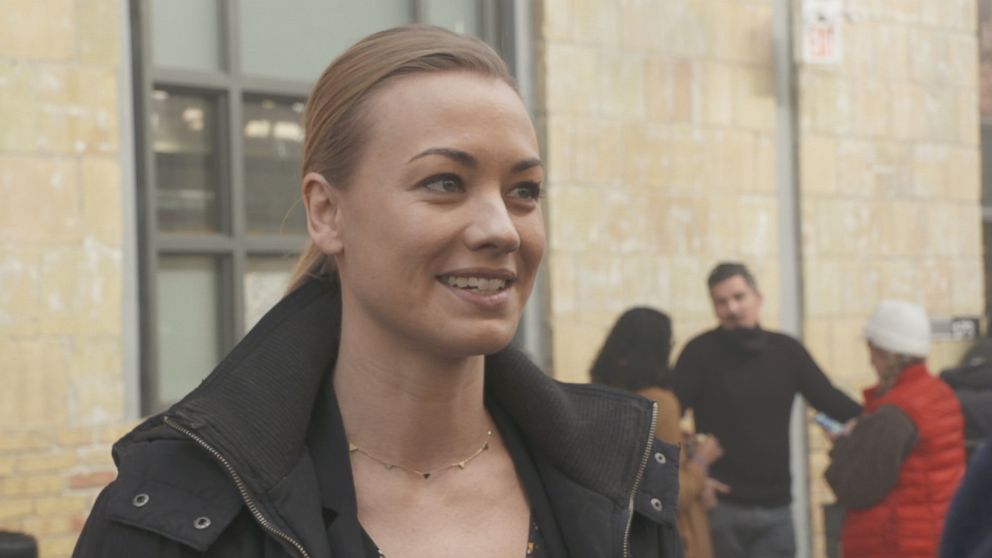
"It's acting. It's not real life. ... It's what I love to do," Moss said. "Ultimately, we want to tell the story of these people, tell the story of our particular characters and be, be truthful to them and be truthful to this story and the story that Margaret wrote."
Moss said as important as the message is, so is the story itself.
"We're not doing the show as politicians. We are actors and writers and producers and creative people," she said. "One of the purposes of art is to hold a mirror up to our society and whether good or bad to hopefully take a look at ourselves."




